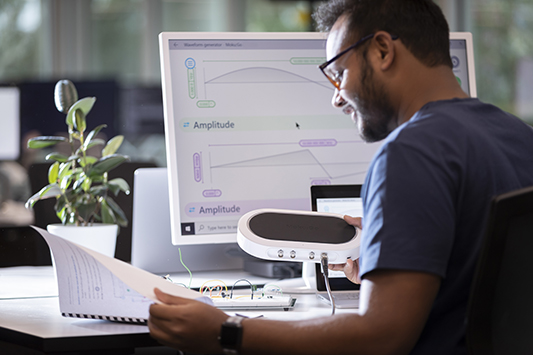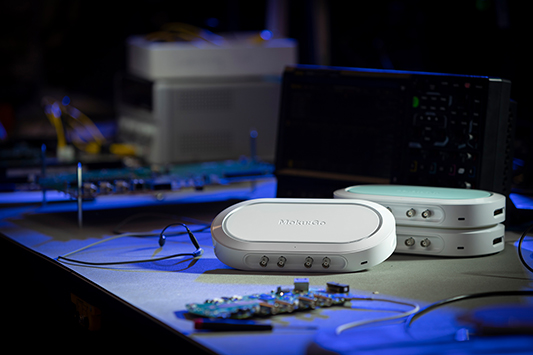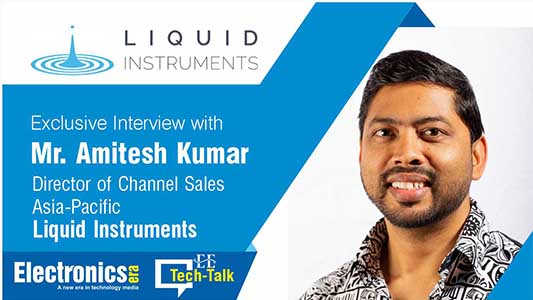Visvesvaraya Technological University (VTU), one of the largest technological universities in India, established by the government of Karnataka, recently integrated Moku:Go from Liquid Instruments into its engineering syllabus, bringing a reconfigurable suite of test and measurement instruments to thousands of undergraduate students at more than 150 colleges. The curriculum will help bridge the gap between practical and theoretical learning to prepare Indian engineering students for the modern workforce with industry-relevant skills. With VTU’s new foundation in place, Liquid Instruments shares what’s next for expanding this impact.

1. Congratulations! In simple terms, tell us about Moku:Go.
Moku:Go combines a compact hardware design with intuitive software to provide a reconfigurable suite of test and measurement instruments for both fundamental and advanced education applications. Built on a flexible, field-programmable gate array (FPGA), Moku:Go assists with labs and demonstrations by enabling educators and students to quickly configure single- and multi-instrument test scenarios and explore concepts such as digital signal processing and control systems in real time, all with a single device. From audio and power electronics to analog and digital design, Moku:Go helps students explore and test concepts with confidence. With 14+ instruments, from an oscilloscope to a PID controller, Moku:Go delivers the right tools for electronic design, debugging, and data collection. Students can also tackle more advanced applications with the ability to implement custom FPGA code, comprehensive API support, and specialised instruments for optics and photonics research like the lock-in amplifier and laser lock box — unavailable on any other device in this class.
2. Tell us more about your Indian partners and their role in developing this program.
Tessolve Semiconductors is a premier design house and end-to-end silicon and systems partner for global semiconductor and engineering firms, as well as universities. With over 3,000 employees and a robust 20-year history, Tessolve delivers substantial impact through its advanced labs and innovative solutions. Tessolve and its affiliate Spruha Solutions work closely with top academic institutions in India to help develop the next generation of engineers. With trusted local partners like Tessolve and Spruha, Liquid Instruments can help professors successfully deploy the new technology while supporting their goal to prepare students for internships and employment opportunities.
3. Why did VTU select Moku:Go for its syllabus when there are other products available from different companies?
Moku:Go meets VTU’s goal to prepare students for the evolving job market by delivering unmatched flexibility, performance, and value, ensuring students learn relevant skills across a range of engineering disciplines with one device. This partnership will ensure better support and resources for students, including training, workshops, and access to modern tools. Beyond VTU, discussions are underway with universities in the neighbouring states of Andhra Pradesh and Telangana to further expand the platform’s reach.

4. With more than 150 colleges under VTU, how do Liquid Instruments, Tessolve, and Spruha plan to support a large number of student and faculty users?
Liquid Instruments, along with our local partners at Tessolve and Spruha, are committed to supporting VTU students and educators through a structured, scalable approach. We plan to collaborate with faculty members to design customised lab setups that align with the specific curriculum and research needs of each college. By developing modular and cost-effective configurations, we can tailor the Moku:Go education labs to fit varying budgets and capacities, ensuring accessibility for colleges of all sizes. We plan to offer hands-on training programs for faculty and students to ensure effective usage of the labs. These programs will help enhance the educational experience, foster innovation, and empower educators to integrate Moku technology into their lesson plans. We also plan to launch special pilot programs at select colleges to demonstrate the capabilities and advantages of reconfigurable instrumentation in educational settings, helping to showcase the impact to other institutions. We will work closely with VTU to identify key colleges for early adoption and leverage success stories as case studies. These partnerships will help build trust and encourage adoption across the wider network of VTU-affiliated colleges. By combining state-of-the-art technology, practical training, and strategic partnerships, we aim to empower VTU colleges with cutting-edge educational tools to prepare students for the workforce.
5. How do you address artificial intelligence and machine learning aspects in reconfigurable instruments? Are there any future roadmaps?
We recently announced the integration of artificial intelligence into the Moku platform, including a brand-new instrument, the Moku Neural Network. Currently available only for Moku:Pro — our flagship device — users can now quickly deploy machine learning models to physical systems for fast, flexible signal analysis, denoising, sensor conditioning, closed-loop feedback, and more. The Moku Neural Network has an architecture that includes input, hidden, and output layers. With microsecond latency, up to five fully connected layers of up to 100 neurons each, and customisable activation functions, it accommodates a range of applications. Users can analyse up to four input channels in parallel mode, or process time series data in serial mode, with up to four outputs for processing experimental data — all in real time. This is just the latest example of how the Moku platform grows with users over time with regular software updates, redefining the cost and effort to move from idea to implementation in advanced research and development applications.
About Liquid Instruments
Co-founded by Prof. Daniel Shaddock of The Australian National University and a team of distinguished research scientists, Liquid Instruments is revolutionising the way that scientists, engineers, and students discover, create, and learn. The company’s reconfigurable, FPGA-based Moku platform delivers a full suite of test and measurement instruments in one flexible device. This versatility helps accelerate the timeline of crossing from idea to implementation by an order of magnitude, reducing the time and cost of advanced research and development in leading technology labs around the world, from aerospace and defence to semiconductors and communications. Moku is the only precision test solution engineered and optimised for friction-free customisation in both simple tests and complex multi-instrument environments. Because Moku is easy to use and versatile, it delivers efficiency gains today and meets ongoing needs in the future. To learn more, visit https://liquidinstruments.com.













